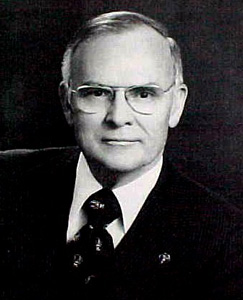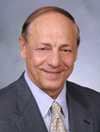| Home | Blog | Ask This | Showcase | Commentary | Comments | About Us | Contributors | Contact Us |

John Moss and the battle for freedom of information, 41 years laterCOMMENTARY | July 184, 2007How one modest but stubborn congressman overcame the many entrenched obstacles to win the American people access to information about the activities of their government. By Michael R. Lemov This July 4th marks the 41st anniversary of the enactment of the Freedom of Information Act, one of the most significant laws ever passed by the U.S. Congress. Reluctantly signed on July 4, 1966 without any public ceremony by President Lyndon Johnson, the Act explicitly incorporates a fundamental principle into American law – one which is, surprisingly, not referred to directly in the Constitution -- that the American people have a right to know the facts regarding the activities of their government. The Freedom of Information Act, which is subject to some significant exemptions (among which are the currently controversial national security and executive privilege exemptions) remains a landmark of Congressional achievement. It was the product of 12 years of bitter struggle between the political power of two presidents and a little known congressman from the Central Valley of California, John E. Moss. Moss was the Act’s primary author, its champion, and the driving force behind its enactment. He believed that adequate knowledge of government actions and the decision-making process was essential for the public to make intelligent decisions about their government and particularly their elected representatives. Moss did not like government secrecy. Nor did he like to be stonewalled by federal agencies. But when he arrived in Washington in 1953 from California, there seemed little reason to suppose that he would assume such a major role in American political history. In the 12-year struggle for enactment of the Freedom of Information Act (FOIA), Moss was compelled to tangle first with President Dwight Eisenhower and a Republican administration. With the U.S. in the grip of Cold War fever, government secrecy grew rapidly. As Bruce Ladd has noted in his book, “Crisis in Credibility,” the prevailing attitude of most federal agencies was, “when in doubt, classify.” Secrecy labels were plastered on everything from innocuous academic articles to agency reports on wasteful spending. The reason often appeared to be to protect the agency from embarrassment, rather than protect legitimate government secrets. Moss, as a first-term member of the obscure House Post Office and Civil Service Committee, was almost immediately frustrated by his inability to obtain information from federal agencies regarding seemingly public information. He first ran into problems with government secrecy when he requested documents from the U.S. Civil Service Commission on the firing of 2,800 federal employees, allegedly for “security reasons.” Moss thought the reasons given were too vague and sought more details, since “security” could cover a broad variety of conduct and reflect badly on the workers who were fired. The Civil Service Commission flatly refused to furnish the information. With a Republican President in the White House and Republicans in power in Congress, Moss was blocked. When the Democrats regained control of Congress in 1955, Moss, then only in his second term in Congress, urged the leadership to create a Special Subcommittee on Government Information as a part of the Committee on Government Operations, of which Moss was now a member. Surprisingly, they agreed to establish the special subcommittee and, even more surprisingly, made the young congressman its chairman. That initiated a tenacious struggle that ultimately resulted in enactment of the Freedom of Information Act. Virtually every executive branch department testified against the bill before the Moss subcommittee, asserting it would cripple the operations of federal agencies if they could not operate in secret when they deemed it appropriate. Moss called panels of newspaper reporters, editors, educators and scientists. They largely supported the need for more open government. He also conducted ongoing investigations of some of the most blatant and unjustified cases of withholding information, which received wide press coverage. When Democrats took over the White House, Moss assumed that passage of FOIA legislation would proceed more smoothly. He was wrong. Lyndon Johnson didn’t particularly like the concept of a public right to government information. Perhaps no president really wants the internal operations -- and mistakes -- of his administration known to the press and the public. The Johnson administration’s main witness on the proposed FOIA law was an assistant attorney general, Norbert A. Schlei, who flatly opposed the concept of a national freedom of information law: As Ladd reported, Schlei testified: “The problem is too vast, too protean to yield to any such solution.” The Justice Department testimony offered absolutely no alternatives to Moss’s FOIA bill and was interpreted as threatening a presidential veto if the bill passed. Moss forged ahead anyway. The subcommittee, which he had worked so hard to establish, was at one point threatened with a loss of funding during the long struggle for the FOIA. In the process of getting the act passed by the House and Senate, Moss was once called out of a hearing by then House Speaker John McCormack and advised that President Johnson wanted the bill “deferred.” Years later, when I spoke with Moss about this incident, he did not confirm the exact nature of the conversation, but said, “I would not have even talked to the president about the bill, if he wanted me to. I did what I had to do.” Moss got some help from other quarters. A crew-cut freshman Republican congressman from Illinois, Donald H. Rumsfeld, became a member of the subcommittee. He rallied some Republican support for FOIA. That, plus the threat of political damage to the Democrats in the 1966 elections forced LBJ to sign the act. Adamant to the end, LBJ told his assistant Bill Moyers that FOIA would without doubt “screw my administration.” Moss paid dearly for his tenacious support of open government and his willingness to oppose the leadership of his party. He was made deputy majority whip in his early years and was on track, perhaps, toward becoming the speaker, majority leader, or whip. But as a result of his insubordination, he was eliminated from the House leadership track. He never became a full committee chairman. A member of Congress does not oppose the Speaker of the House and his party’s President, no matter how important the issues, without severe personal risk. Although he returned to FOIA several times during his years in Congress to sponsor strengthening amendments, Moss went on to other great challenges. He was the primary author and champion of legislation creating the Consumer Product Safety Commission, strengthening Federal Trade Commission enforcement powers and establishing motor vehicle safety recall authority in the Department of Transportation. On this 41st anniversary of Moss’s greatest achievement, with the principles of the Freedom on Information Act under continuing pressure from a terrorist-obsessed administration, it may be useful to consider what made this little-known, unheralded congressman such a fighter for the principles of open government, as well as consumer and investor protection. Perhaps some background about the development of one public servant will help enlighten the troubled times in which we live. About John E. Moss Moss was born in 1915 in Carbon County, Utah. He was the son of a coal miner, who was poor and made up for it by hard drinking. It was a desperate time for miners. Moss told me that he woke up one morning to find U.S. troops armed with machine guns posted on the porches of houses in Hiawatha, the little town where he lived, because the miners were on strike. The family left Utah to move to California in 1923, in part, because Moss was a sickly child with both asthma and heart problems. Things in California did not go smoothly for the Moss family. His mother died in 1927 when he was 12 years old. His younger sister died the same year from an infection that penicillin might have easily cured. Moss’s father then abandoned his surviving children, leaving Moss and his brother to live alone in a loft. Moss supported himself. He worked as a stock clerk, tire salesman and repossession agent, department store clerk; at times he drove a hearse to make extra money. Moss had so little money that he walked miles to Sacramento Community College to save the 10 cent bus fare, which he used to pay for gas to heat canned spaghetti for dinner in the loft that he and his brother shared. Sometimes he ate the spaghetti cold, for lack of a dime. Moss went into business as a young man in Sacramento. He couldn’t afford to finish college or go to law school. He sold appliances and was a real estate broker. He got involved in Democratic politics, rising up through the ranks to become president of the Sacramento Young Democrats and a party regular. He now had a bit of financial independence, but not much. These were still the Depression years. Franklin D. Roosevelt became Moss’s great political role model. He believed FDR wanted to make life better for the average person. He thought Roosevelt had a plan and would try almost anything to get the country out of the Depression. Moss admired FDR for trying new approaches. Most of all, he admired him for trying to help working people. Moss’s daughters Allison and Jennifer told me money was never a driving force in Moss’s life. He cared most about public affairs and the public interest – not money. After 26 years in Washington, and service on the powerful House Energy & Commerce Committee, as well as the House Government Operations Committee (with jurisdiction over the Freedom of Information Act), Moss could have left Washington a rich man, as have many other members of Congress. But he retired to California, with little in his bank account and mostly a federal pension to take care of himself and his wife Jean. Moss’s widow and his children live modestly to this day. In a conversation we had just before he died in 1997, I asked Moss if there were some things he would have liked to accomplish that he had not managed to do in his 26-year congressional career. He told me that laws like the Freedom on Information Act always need improvement. “What we did was just a start. But there was nothing monumental that I wanted to do that I did not do. I didn’t back away from many challenges. Sometimes you cannot compromise, you have to fight.” On this 41st anniversary of the Freedom of Information Act, one of the greatest legislative achievements of Congressman John Moss and of the Congresses in which he served, it is important to remember Moss—and the lesson that money, family name and prestigious educational degrees are not necessarily the stuff of which American heroes are made. (Acknowledgments: The author acknowledges the invaluable assistance of Kathleen Benson, Congressman Moss’s administrative assistant; Paul McMasters of the Freedom Forum; Jean, Allison and Jennifer Moss; and author Bruce Ladd.)
|
||||||||||||||




